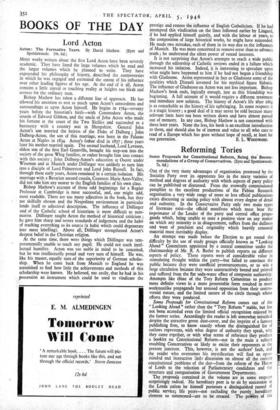BOOKS OF THE DAY
Lord Acton
Acton : The Formative Years. By David Mathew. (Eyre and Spottiswoode. 10s. 6d.)
MOST works written about the first Lord Acton have been severely academic. They have listed the large volumes which he read and the larger volumes which he planned to write. They have expounded his philosophy of history, described the controversies in which he was engaged and estimated the extent of his influence over other leading figures of his age. At the end of it all, Acton remains a little unreal or touching reality at heights too bleak and austere for the ordinary man.
Bishop Mathew has taken a different line of approach. He has allowed his attention to rest as much upon Acton's antecedents and surroundings as upon Acton himself. He begins in 1764—seventy years before the historian's birth—with Commodore Acton, the cousin of Edward Gibbon, and the uncle of John Acton who made his fortune at the court of the Two Sicilies and succeeded to a baronetcy with a country seat in Shropshire. General John Acton's son married the heiress of the Duke of Dalberg ; John Dalberg-Acton, the son of this marriage, was born in the Palazzo Acton at Naples in 1834. Acton's father died in 1837 ; three years later his mother married again. The second husband, Lord Leveson, eldest son of the first Earl Granville, brought his step-son into the society of the great Whig families, or rather brought him into contact with this society ; John Dalberg-Acton's education at Oscott under Wiseman and at Munich under Malinger was unlikely to turn him into a disciple of Lord Palmerston and Lord John Russell. In fact, through these early years, Acton remained in a certain isolation. His marriage with a Bavarian second cousin, Countess Marie Arco-Valley, did not take him any nearer to the English families of his own class.
Bishop Mathew's account of those odd beginnings for a Regius Professor at Cambridge is most successful, and, one might add, most readable. There are too many adjectives in the book, but they are skilfully chosen and the Neapolitan environment in particular lends itself to adjectival description. The influence of Malinger and of the Catholic school of historians is more difficult to sum- marise. Malinger taught Acton the method of historical criticism ; he gave him sharp and severe standards of judgement and the habit of tracking everything to its source (a habit which could degenerate into mere labelling). Above all, Dellinger strengthened Acton's deepest belief in the Christian religion.
At the same time, there were things which Dellinger was tem- peramentally unable to teach any pupil. He could not teach intel- lectual humility. Acton was too noble in mind to be conceited, but he was intellectually proud and very sure of himself. He was, like his master, equally sure of the superiority of German scholar- ship. When he came back from Munich to England he was astonished to find how little the achievements and methods of this scholarship were known. He believed, too easily, that he had in his possession an instrument which could be used to vindicate the
prestige and restore the influence of English Catholicism. If he had attempted this vindication on the lines followed earlier by Lingard, if he had applied himself quietly, and with the labour of years, to the composition of large historical works, he might have succeeded. He made two mistakes, each of them in its way due to the influences of Munich. He was more concerned to remove error than to advance truth ; he underrated the silent power of vested interests.
It is not surprising that Acton's attempts to reach a wide public through the editorship of Catholic reviews ended in a failure which increased his isolation. Indeed, it is interesting to speculate upon what might have happened to him if he had not begun a friendship with Gladstone. Acton represented in fact to Gladstone some of the qualities which Disraeli invented for his mythical figure Sidonia. The influence of Gladstone on Acton was not less important. Bishop Mathew's book ends, logically enough, just as this friendship was beginning. A full account of it would require a different treatment and introduce new subjects. The history of Acton's life after 1864 is as remarkable as the history of his upbringing. In some respects it is a tragic history ; a good deal of it may never be told because many relevant facts have not been written down and have almost passed out of memory. In any case, Bishop Mathew is not concerned with these later years. None the fess, his book is an excellent introduction to them, and should also be of interest and value to all who care to read of a Europe which has gone without hope of recall, at least for
our generation. E. L. WOODWARD.






























 Previous page
Previous page